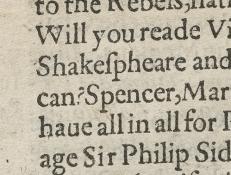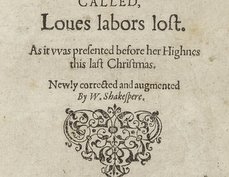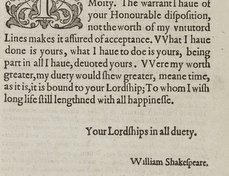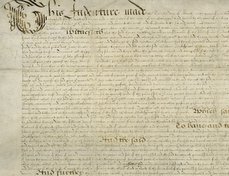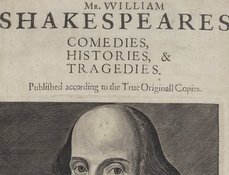From the collections of: THE BRITISH LIBRARY
Terms of use
The British Library has graciously contributed the above images to Shakespeare Documented under a Creative Commons Public Domain Mark.
Copyright status of the manuscript and unpublished Materials: The 1988 Copyright, Designs and Patents Act (as amended) states that unpublished literary and artistic works remain in copyright in the UK until at least 31 December 2039. Therefore important parts of the library’s collection remain in copyright, including very old manuscripts. However for unpublished material created many centuries ago and in the public domain in most other countries, the Library believes this material to be very unlikely to offend anyone. As an institution whose role it is to support access to knowledge, we have therefore taken the decision to release certain digitised images technically still in copyright in the UK under the Public Domain Mark.
Document-specific information
Creator: Richard Carew
Title: Genealogical and historical collections, much of it published in William Camden, Remaines of a Greater Worke, concerning Britaine (London, 1605)
Date: 1595 or 1596
Repository: The British Library, London, UK
Call number and opening: Cotton Julius F XI, fol. 267r-v
View online bibliographic record
Alan H. Nelson and Folger Shakespeare Library staff, "The excellencie of the English tongue: Richard Carew compares Shakespeare and Marlowe to Catullus," Shakespeare Documented, https://doi.org/10.37078/586.
British Library, Cotton Julius F XI. See Shakespeare Documented, https://doi.org/10.37078/586.
Richard Carew (1555-1620) was a British antiquary, most famous for his Survey of Cornwall (1602). Following the publication of this masterwork, Carew composed an essay, “The excellencie of the English tongue,” apparently in response to the denigration of the language by the Catholic polemicist Richard Verstegan (ca. 1550-1640) in A restitution of decayed intelligence: in antiquities concerning the most noble and renovvmed English nation (1605). A manuscript copy of Carew’s essay, shown here, was acquired by William Camden (1551-1623), another antiquarian, who published it, giving full credit to Carew, in the second edition of his Remaines, concerning Britaine (1614), pp. 36-44. (Carew’s essay is not included in Camden’s first edition of 1605.)
In the final section of his treatise (fol. 267 verso), Carew argues that English is as lively and graceful as any other language. He cites contemporary English writers to illustrate his point: “Shakespheare” and Christopher Marlowe are equal to Catullus (second image, third line from the bottom of the first paragraph); Samuel Daniel is equal to Ovid; Edmund Spenser is equal to Lucan; and Sir Philip Sidney is “the miracle of our age.” Carew here equates Shakespeare’s Venus and Adonis and Marlowe’s Hero and Leander (unfinished at his death in 1593) to the Roman poet Catullus’s Ariadne and Theseus. Whether by ignorance or by a mistake of copying, Marlowe is given in both the manuscript and in the 1614 imprint (p. 44) as “Barlowe,” while Hero and Leander is called, simply, “Barlows fragment.” “Shakespheare” falls well within the range of contemporary spelling variants.
Whatsoever grace any other language carrieth, in Verse, or Prose, in Tropes, or Metaphors, in Echoes or Agnominations, they may all be lively and exactly represented in ours. … Will you read Virgil? Take the Earl of Surrey. Catullus? Shakespeare, and Marlowe’s fragment. Ovid? Daniel. Lucan? Spencer. Martial? Sir John Davies and others. Will you have all in all for Prose & Verse? Take the miracle of our age, Sir Philip Sidney.
[This transcription is pending final vetting]
[Image 1: fol. 267r]
[Marginalia in the left hand margin]
Of Latin
the French (line 2)
defects. of othe[r]
tongues (line 6)
All sortes of
Verses. (line 24)
Sweetenes. (line 28)
Compared with
Others. (line 31)
[To be inserted in text at the plus-mark in line 7]
+ Neither Porcus, Capo, Verver, a ^Bawde Hogg, Cappon, a wether,
as Cuincuius, noteth ad Tit. de vert. signif.
[Main section of text]
Diuers wordes alsoe wee deriue out of the Latyne at second hand by the
French, and make good English though both Latyne and French, haue their
handes Closed in that behalfe, as verbs, Praye, Pointe, Paze, Prest Kent, &c.
and alsoe in the aduerbes Carpingly:) Currantly: actiuely, Colourably &c.
Againe in other languages there fall out defects while they want meanes to
deliuer that which an nother tongue expresseth as (by Ciceroes obseruation) you
cannot interpret ineptus (vnapt vnfitt, vntoward, in Greek ^+ noe more cann
you, to stand, in ffrench, to Tye in Cornish, nor Knaue in Latyne, for Nebulo is a Clo=
wdye fellow, or in Irishe, whereas you see our abillitye extendeth therevnto. Moreouer ye
Copiousnes of our languadge appeareth in the diuersitye) of our dialectes, for wee haue
Court, and wee haue Countrye Englishe, wee haue Northern, & Southerne, grosse and
ordinary, which differeth, from other, not only in the terminacions, but alsoe in many
words termes and Phrases, and expresse the same thinges in diuers sortes yeat
all right Englishe alike, neither Cann any tongue (as I am perswaded) diliuer a matter
with more varietye then ours, both plainely and by prouerbes and Metaphors, for exam=
ple when wee would be rid of one, wee vse to saye, Bee going, trudge, pack, be faring,
hence awaye, shifte, and by circumlocution, rather your roome then your companye,
Letts see your backe, Com againe when I bid you, when you are called, sent for,
intreated, willed disiered invited, spare vs your place, another in your steede,
a shipp of salte for you, saue your Credite, you are next the doore, the doore is open
for you, thers noe bodye holdes you, ^ teares your slew &c. Likewise this worde fortis
wee maye Synnonomize. after all these fashions, stout, hardye, valiaunt, orpad,stockworth, doughtye Couragious, stomecked, aduenturous &c.
And in a worde to close vp these p\r/ooffes of our Copiousnes, looke into our Imitacione of
All sortes of verses affovrded, by any other Languadge, and you shall finde that Sir
Phillip Sydney, Mr Stanihurst, ad diuers moe, haue made vse s.., how farre wee are
within compasse of a fore imagined impossibility in that behalff.
I com nowe to the last and sweetest point, of the sweetnes of our tongue. Which shall appeare
the more plainelye, yf like towe Turkeyes, or the London Drapers wee match it with
our neighboures. The Italyan is pleasante but without synewes, as to to stillye fleeting water, The
French, delicate but ouer nice as a woman scarce daring to open her lipps for feare of
marring her Countenaunce, The Spanishe maiesticall, but fullsome, runninge to much
on the .O. and terrible like the deuill in a playe, The Dutch. manlike but withall
very harshe, as one ready at euery worde to picke a quarrell. Now wee in borrowing
[Image 2: fol. 267v]
[Marginalia in left hand margin]
Mixture (line 7)
Verse & Prose (line 12)
[Main section of text]
from them, geue the strength of Consonantes to the Italyan, the full sounde of <…>
wordes to the ffrench, the varietye of terminacions to the Spanish, and ye mollifieinge
of more vowells to the Dutch, And soe (like bees) gather the honye of their good
properteis and leaue the dregges to themselfes, And thus, when substantiallnes
Combyneth with delightfullnes, fullnes, with fynes, seemelynes with portlynes, and
Courrantnes with staydnes, howe canne the languadge which consisteth of all
these, sounde other then most full of sweetnes. Againe the Longe wordes that
wee borrowe, being intermingled with the shorte of our owne store, make vp a profitt
harmonye, by culling from out which mixture (with Judgment) you maye frame your
speech according to the matter you must worke on, maiesticall, pleasaunte, delicate,
or manly, more or lesse, in what sorte you please: Adde therevnto, that What soeuer
grace any other languadge carryeth, in Verse, or Prose, in Tropes, or Metaphors, in
Ecchoes or Agnominations, they maye all be liuely and exactly represented in ours, will
you haue Platos vayne? reede Sir Thomas Smith, The Ioinick? Sir Tho: Moor, Ciceros?
Aschame, Tacitus? Stanihurst, Varre? Chaucer. Demosthenes, Sir John Cheekes (who
in his treatise to the Rebells, hath Comprised all the figures of Rhetorick will
you reade Virgill? take the Earell of Surrey. Catullus? Shakespheare, and Barlowes
fragment. Ouid? Daniell, Lucane? Spencer, ^Martiall, Sir John Dauis and others, will you haue
all in all for Prose & Verse?
take the mirab^cle of our agg adge Sir Philip Sydney.
And thuse, if myne owne Eyes be not blinded by affection I haue made yours to see,
that the most renowned of other nations haue laied up, as in Treasure, and entrusted
the Diuios orbe Britannos, with the rarest Jewelles of their lipps perfections,
whither you respect the vnderstanding for significancye, or the memorye for
Easynes, or the Conceipt for plentifullnes, or the Eare for pleasauntnes, wher=
in if inough bee deliuered, to add more then Inough, weare superfluous, if to
little, I haue it to be supplied by better stored Capacityes, if ought
amisse, I submitte the same to the disciplyne of euery able and Impartiall
Censurer.
Co-written by Folger Shakespeare Library staff and Alan H. Nelson
Last updated July 11, 2020



